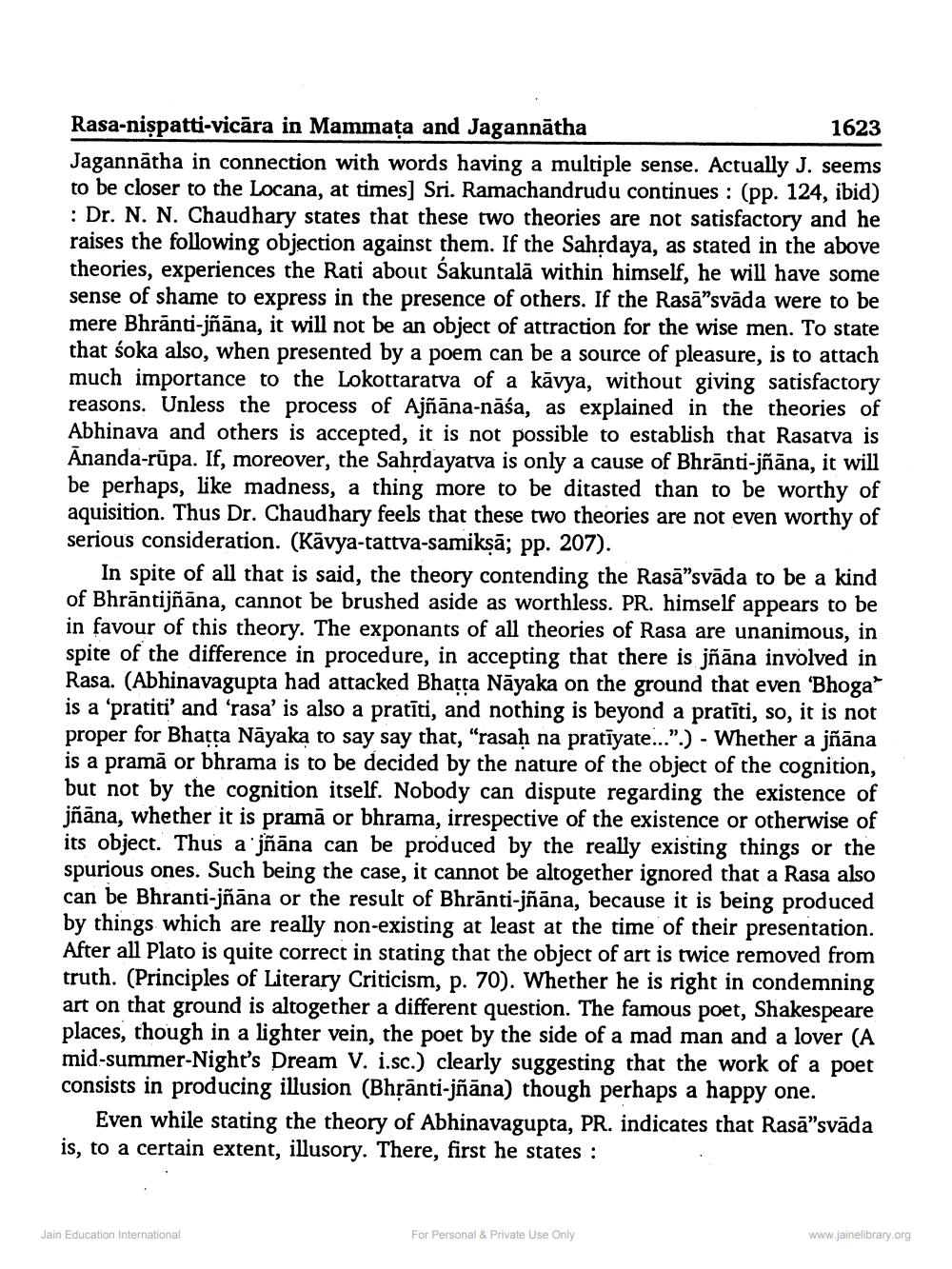________________
Rasa-nispatti-vicāra in Mammaţa and Jagannātha
1623 Jagannatha in connection with words having a multiple sense. Actually J. seems to be closer to the Locana, at times] Sri. Ramachandrudu continues : (pp. 124, ibid) : Dr. N. N. Chaudhary states that these two theories are not satisfactory and he raises the following objection against them. If the Sahrdaya, as stated in the above theories, experiences the Rati about Sakuntala within himself, he will have some sense of shame to express in the presence of others. If the Rasā”svāda were to be mere Bhrānti-jñāna, it will not be an object of attraction for the wise men. To state that śoka also, when presented by a poem can be a source of pleasure, is to attach much importance to the Lokottaratva of a kāvya, without giving satisfactory reasons. Unless the process of Ajñāna-nāśa, as explained in the theories of Abhinava and others is accepted, it is not possible to establish that Rasatva is Ananda-rūpa. If, moreover, the Sahrdayatva is only a cause of Bhrānti-jñāna, it will be perhaps, like madness, a thing more to be ditasted than to be worthy of aquisition. Thus Dr. Chaudhary feels that these two theories are not even worthy of serious consideration. (Kavya-tattva-samiksā; pp. 207).
In spite of all that is said, the theory contending the Rasā”svāda to be a kind of Bhrāntijñāna, cannot be brushed aside as worthless. PR. himself appears to be in favour of this theory. The exponants of all theories of Rasa are unanimous, in spite of the difference in procedure, in accepting that there is jñāna involved in Rasa. (Abhinavagupta had attacked Bhatta Nāyaka on the ground that even 'Bhoga? is a 'pratiti' and 'rasa' is also a pratīti, and nothing is beyond a pratīti, so, it is not proper for Bhatta Nayaka to say say that, “rasaḥ na pratīyate...”.) - Whether a jñāna is a pramā or bhrama is to be decided by the nature of the object of the cognition, but not by the cognition itself. Nobody can dispute regarding the existence of jñāna, whether it is pramā or bhrama, irrespective of the existence or otherwise of its object. Thus a jñāna can be produced by the really existing things or the spurious ones. Such being the case, it cannot be altogether ignored that a Rasa also can be Bhranti-jñāna or the result of Bhrānti-jñāna, because it is being produced by things which are really non-existing at least at the time of their presentation. After all Plato is quite correct in stating that the object of art is twice removed from
nciples of Literary Criticism, p. 70). Whether he is right in condemning art on that ground is altogether a different question. The famous poet, Shakespeare places, though in a lighter vein, the poet by the side of a mad man and a lover (A mid-summer-Night's Dream V. i.sc.) clearly suggesting that the work of a poet consists in producing illusion (Bhțānti-jñāna) though perhaps a happy one.
Even while stating the theory of Abhinavagupta, PR. indicates that Rasā"svāda is, to a certain extent, illusory. There, first he states :
Jain Education International
For Personal & Private Use Only
www.jainelibrary.org




